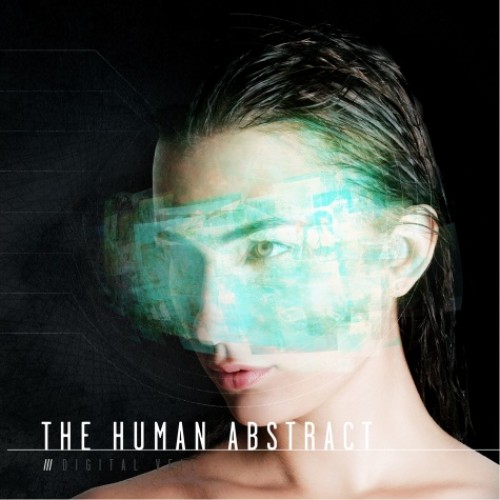
(Our workaholic contributor Andy Synn checks in for the second day in a row, this time with his review of The Human Abstract‘s new release, which debuts today.)
WARNING: THE FOLLOWING ALBUM CONTAINS LARGE DOSES OF CLEAN SINGING. THOSE WITH A WEAK DISPOSITION SHOULD NOT ATTEMPT TO LISTEN TO THIS ALBUM WITHOUT MEDICAL PERMISSION.
A remarkably divisive band, the career of the collective known as The Human Abstract has had many ups and downs, infuriating their core fan base with various changes in direction, alienating the metal elite with their associations (perceived or real) with many of the more maligned bands and sub-genres of the modern age, and frankly pursuing an altogether contrary and wilfully difficult career path.
Of particular note has been the band’s inconsistent and frequently changing line-up. Since their formation in 2004 the band have accrued a large number of ex-members and existed in a surprising variety of different forms.
The plus side of all this has been that the band have forged a fiercely unique identity within the metal sphere. While they will never be heavy or “legitimate” enough to cross-over with fans of truly heavy death metal influenced bands, they do incorporate some truly abrasive moments of honest to god metallic harshness amongst the neo-classically influenced guitar-work and soaring, prog vocals lines. (more after the jump . . .)
 Introductory instrumental “Elegaic” begins with beautiful, minimalist strains of classical guitar before exploding into bright, vibrant form, as the guitars swoop and soar with almost carefree abandon. It definitely serves to ramp up the expectations for when the album proper begins, which I suppose is the real purpose of such an introductory track!
Introductory instrumental “Elegaic” begins with beautiful, minimalist strains of classical guitar before exploding into bright, vibrant form, as the guitars swoop and soar with almost carefree abandon. It definitely serves to ramp up the expectations for when the album proper begins, which I suppose is the real purpose of such an introductory track!
Following this, “Complex Terms” lives up to its name with its winding, complex interplay of instruments and mix of vocal styles. The song works perfectly as a great introduction to new vocalist Travis Richter, who easily lives up to (and potentially eclipses) the legacy of his predecessors, equally able to deliver powerful, aggressive harsh vocals and almost operatic cleans that provide emotional depth without ever feeling overblown. The opening flurry of tech-death punches and weaving jabs of furious note flurries is balanced by the epic, theatrical elements of melody and structure which recall the most extravagant moments of British prog-darlings Muse. The song is ambitiously structured and manages to make a mix of styles flow naturally and organically, while the musicianship is never short of stellar. The closing anthemics and complex guitars work perfectly in sync without ever coming across as contrived or excessive.
Shortest and punchiest song “Digital Veil” has a much heavier vibe, along with that distinctive “Pull me / From the gallows” hook which the band debuted before the album’s release. Heavier and relatively more straightforward than “Complex Terms”, this song has a far darker vibe, accented by tougher drumming, which drives home the more attacking nature of the song. The tech-death side of the band is far more in the ascendant for this song, with a greater emphasis on overall speed and technicality in the delivery of the complicated, intricate guitar work and furious drumming.
My only complaint about the song would be that it seems to be aiming to be heavier than it actually comes across, and I’d attribute this mainly to the quite dry production and rather clinical guitar tone which, although it works so well when the band mix their multiple layers of instrumentation into a progressive melding of forms, serves to slightly limit some of the more aggressive and direct moments of the song.
 “Faust” throws a curveball at the listener with the neo-classical guitar shredding which opens the song, as it swiftly transforms into a more considered, heavier pattern of inter-locking drums and stop-start guitars, before just as swiftly shifting gears into a sombre, progressive mien accented by beautifully morose vocal melodies. Throughout the song the band naturally and smoothly transition between what would, in less capable hands, be extremely jarring shifts in style and direction. The vocals match believably harsh, aggravated roars of discontent with the more mellifluous, proggy styles which have become the band’s hallmark throughout its history, even delving into many-layered operatic modes which betray the fingerprints of Queen and Muse (both bands similarly hard to categorise in their own rights).
“Faust” throws a curveball at the listener with the neo-classical guitar shredding which opens the song, as it swiftly transforms into a more considered, heavier pattern of inter-locking drums and stop-start guitars, before just as swiftly shifting gears into a sombre, progressive mien accented by beautifully morose vocal melodies. Throughout the song the band naturally and smoothly transition between what would, in less capable hands, be extremely jarring shifts in style and direction. The vocals match believably harsh, aggravated roars of discontent with the more mellifluous, proggy styles which have become the band’s hallmark throughout its history, even delving into many-layered operatic modes which betray the fingerprints of Queen and Muse (both bands similarly hard to categorise in their own rights).
A short piano led section (supplied by returning guitarist A. J. Minette) adds another element of subtle experimentation, breaking up the more guitar-led sound the band has cultivated, before an almost carnival-like guitar line segues the section back into the heavier, punchier sound of a band in full control of their faculties and direction.
With “Antebellum”, the longest song on the disc by far (and perhaps the keystone of the entire album), the band pushes the prog elements fully to the forefront of their sound, a soaring vocal line and unpredictable pattern of synchronised guitar and drums leading into an extended section of classical guitar melodies and restrained drums, before the crunchy rhythm section returns in full force, backing a dizzyingly complex lead line. Moments of meditative calm are matched with raging torrents of metallic fervour, waxing and waning in an almost entirely random manner that belies the attention to detail and song-writing skills of The Human Abstract who remain fully in control of this chaotic carnival of competing styles.
In the closing stages of the song the cacophonous runs of intricate guitar lines and bewildering drumming could almost become too much were it not for the sense of human reality provided by the intense, emotional performance of Travis Richter whose vocals, both screamed and clean, are layered to great effect and provide an anchoring point for any listeners seemingly lost by the endless time changes and shifts in style.
 Wisely, the band choose to follow this prog tour-de-force with the heaviest song on the disc, “Holographic Sight”, which chugs and smashes its way through a series of harsh, clanging riffs and dissonant lead parts. The drums in particular are more intense on this song than any other, unbelievably tight and complex kick patterns giving each riff real heft and bite, while the vocals are believably tortured in their raging invective. It’s a particularly explosive song, abandoning much of the melody which characterises the rest of the album in favour of a more clinical, overtly threatening mix of death metal power and jazzy dynamics which serve to cultivate an unsettling atmosphere. Frantic, desperate sweeps of notes combine with purposefully oblique riffing and serve to enhance this feeling of displacement, which culminates in an eerie, disconcerting mid-section before the violence resumes once more, tempered only by a single solo which provides the tracks only real moment of harmony.
Wisely, the band choose to follow this prog tour-de-force with the heaviest song on the disc, “Holographic Sight”, which chugs and smashes its way through a series of harsh, clanging riffs and dissonant lead parts. The drums in particular are more intense on this song than any other, unbelievably tight and complex kick patterns giving each riff real heft and bite, while the vocals are believably tortured in their raging invective. It’s a particularly explosive song, abandoning much of the melody which characterises the rest of the album in favour of a more clinical, overtly threatening mix of death metal power and jazzy dynamics which serve to cultivate an unsettling atmosphere. Frantic, desperate sweeps of notes combine with purposefully oblique riffing and serve to enhance this feeling of displacement, which culminates in an eerie, disconcerting mid-section before the violence resumes once more, tempered only by a single solo which provides the tracks only real moment of harmony.
“From Horizon To Zenith “ has a real latter-day Thrice vibe, particularly in the vocal patterns and general structuring of the song. Cleanly strummed guitars are subtly embellished with shimmering, tranquil leads and calm, meandering bass lines. The emotive vocals thankfully never come across as forced or self-pitying, instead conveying a real sense of desperation and frustration, without ever losing their distinctive, original sound or keen sense of off-beat melody. Even the more boisterous moments of the song retain this particular focus on melody, never sacrificing it to instead pursue some artificial standard of heaviness or legitimacy.
The mid-section of the song serves as a masterful display of the use of technical ability to actually tell a story, rather than simply show-off the band’s talents to the detriment of the song overall. The mesmerising interplay of guitars and bass (yes the bass really shines on this song) captures the attention fully whilst also requiring several further listens to tease apart the different layers of sound appealing for one’s attention. Presaging the end of the song, a beautifully introspective moment of elaborate piano, matched only by a simple vocal melody, creates a sense of contrast and depth which allows the louder, more forceful elements of the song to attain their full majesty.
 “Patterns” ends the album in triumphant fashion. From a slow burning opening, the song gradually builds in intensity, showing admirable care and restraint in its employment of competing melodies, technical elements and metallic force. The early stages of the song feature perhaps the best vocal performance on the entire disc, the soothing cleans fitting perfectly over the calm, reflective guitar strains, allowing for a moment of contemplation on the controlled, beautiful chaos that the band has crafted thus far.
“Patterns” ends the album in triumphant fashion. From a slow burning opening, the song gradually builds in intensity, showing admirable care and restraint in its employment of competing melodies, technical elements and metallic force. The early stages of the song feature perhaps the best vocal performance on the entire disc, the soothing cleans fitting perfectly over the calm, reflective guitar strains, allowing for a moment of contemplation on the controlled, beautiful chaos that the band has crafted thus far.
This peace is shattered by the explosion of a soaring, turbulent guitar solo, for me the finest on the disc, which manages to weave intricate melodies into its tumultuous, blistering delivery. A short, teasing return to the quiet, reflective mood of the song’s beginning is swiftly overwhelmed by a massive barrage of metallic riffing and an outpouring of vituperative vocal venom, dragging the album down into the gutters only for a return of soaring, melodic vocals to raise it back into the light moments before the whole thing collapses in upon itself.
To my ears this is a phenomenal album, and clear career highlight of the band, as totally unbound by convention or the laws of prevailing fashion as it is free of the limitations and expectations of any particular style or definition.
EDITOR’S NOTE: To give you a taste of this masterful album’s accomplishments, here’s “Complex Terms”:
[audio:https://www.nocleansinging.com/wp-content/uploads/2011/03/02-Complex-Terms.mp3|titles=The Human Abstract – Complex Terms]
They are a capable bunch, with a number of great songs. The above is one of them. A lot of it is highly freaky, and too neo-classical for my personal liking. Probably need to drink more when I listen to this band.
I must say that this album owns. It stayed true to what The Human Abstract was all about when they released Nocturne. At the same time, however, Travis Richter brings a whole new level of heaviness to the band. Kudos to his performance on this record.
Gotta play devil’s advocate on this one.
I have no idea why people are hyping this release and this band in general. This album, to my ears, is just about everything WRONG with prog metal and most things wrong with pop metal as well. The hooks are forced/lack flow. The album feels like a collection of parts stitched together with too much soundscaping/FX. The guitar lines are over-indulgent.
In general it just feels monochromatic. Lifeless. Obstructive and inhuman as its title suggests.
Is it better than Nocturne? Yeah, but Nocturne was also a horrible record.
My take: skip this, wait until the new Protest the Hero comes out. THAT band is this band’s superior in absolutely every regard.
I wasn’t really hyping it… I was just reviewing it!
I do have the new Protest though, and it is also a great record.
This thing is getting mad hype from people besides you, Andy. IDK why It’s basically a collection of bad Deftones-Meets-The Faceless tracks with terrible nasal-harmonized cleans and weak too-safe screams.
I still can’t sit through it.
I actually think it’s a more ambitious album than Protest’s to be honest. Although that doesn’t necessarily equal better of course.
The new singer blows he made themm sound like everyone else bad screams and no heart. Its a shame to see a great band be doomed by bad vocals